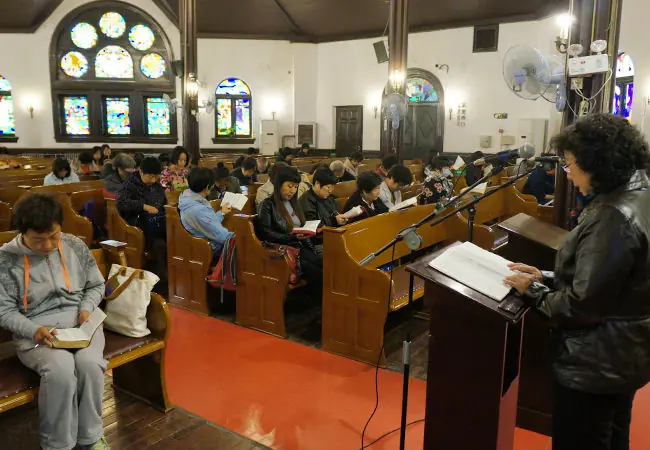Plug into God’s Word

The scriptures were meant to be read and heard. Shut the world out for a while. Plug into God’s Word.
Two hours and ten minutes. That is how long it took me to get through the seemingly impassable territory of Leviticus. The ‘dreaded’ book has a reputation for taking down many a determined Christian who faithfully follows their annual Bible reading plan. The secret of my apparent success? I did not read Leviticus. I listened to it.
I plugged in my headphones to listen intently to streaming audio from the YouVersion app. I concentrated on the words I heard. My mind kept recreating various scenes I read about—sacrifices and Jewish cultic rituals. I sketched a mental map of the book. It was good that I was not following the words on a printed page. There was no distraction or an urge to linger about any exceptional passage. However, I find it helpful to have a pen and paper ready to make a quick note or to create an outline as I continue to listen to the Word.
I noticed that not all of Leviticus was about sacrifices. Even in the descriptions of sacrifices and rituals, there was a certain rhythm and order. From there, the book transitions to rules concerning the priesthood. There are more rules on food, hygiene, and health. At the heart of Leviticus is God’s requirement that His people be holy. Detailed instructions regarding sexual morality, atonement, and holidays were, in fact, about God’s people partaking in His holiness.
Listen to the Bible book-by-book
The scriptures were meant to be read and heard. The ubiquitous smartphone, and the fancy contraption that delivers audio straight into our ear canals, can revolutionize our interaction with the Bible.
Listening to audio Bible – or reading the Bible aloud in a small group – will help us “take in” a whole book in one go. That itself can bring a sea change in our understanding of biblical books. What if you do not grasp the essence of a book the first time you listen to it? That doesn’t matter at all. You only need two or three hours to repeat the exercise! By the time your Christian friends read one book, in instalments, over a month, you would have actively engaged multiple times with the book of your choice.
Besides, the Word will not be confined to the pages of a book or a device. Its message will simmer in our hearts while we go about our daily activities. The sacred text will keep churning in our minds. At certain times of the day, you may wish to chew the cud. Meditate. Worship. Pray. Obey.
There are other key advantages to listening to God’s Word. While we listen, we are forced to retain what we hear to make sense of what we continue to hear. Our minds strive to identify connections between various passages. As a result, we get to “see” the book’s primary flow of thought.
If the author deviates from the main course, we will notice it. In our minds, we continue to track the narrative till he returns to the main story. These mental exercises come naturally to most people. Some might need a little training and patience.
Perhaps, the best natural benefit of listening to a book is this: our mind acts like a sieve that will ‘catch’ and retain the most significant aspects of the text. Yes, we tend to forget stuff soon after we hear it. But we also tend to latch on to things that are repeated. Biblical authors knowing fully well that their writings would be heard rather than read, incorporated numerous literary devices to drive home important points.
Important principles and concepts are repeated. Certain words and phrases are repeated. A good listener will understand the prominent themes by noting oft-repeated ideas. Those who read just a chapter or two daily will not ‘catch’ these repetitions. Who will ever miss the repetition of “And there was evening and there was morning …” in Genesis 1? Other instances of repetition occur beyond our usual daily limit of a single chapter. One such expression in Genesis is, “These are the generations of ….”
Nothing comes close to listening to the Bible in its original languages. In Hebrew and Greek, the repetition of sounds plays a key role. The use of alliteration in Psalm 119 is well known. All lines in each stanza of Psalm 119 begin with the same Hebrew alphabet. There are twenty-four Hebrew letters. There are as many stanzas in that psalm. This might serve as an aid to memory. The careful use of similar-sounding words or words from the same root might aid the communication of key concepts. While describing the purpose of Jesus’ death, Paul says it was “to declare … at this time His righteousness: that he [God] might be just, and the justifier of him which believeth in Jesus.” The words righteousness, just, and justifier come from the same root dikaios. In English, the Douay-Rheims Bible is probably the only translation that reflects this fact: “Through the forbearance of God, for the shewing of his justice in this time; that he himself may be just, and the justifier of him, who is of the faith of Jesus Christ.” Here, the words justice, just, and justifier help us to see the relationship between God’s nature and his acts of salvation. God, in his justice, punished Christ on the cross so that he could be just while dealing with humanity’s sins and at once be the God who justifies sinners who believe in Christ.
How many times should we listen to a book? We must listen until we can state its outline and summarize its message and purpose. Once we are familiar with the overall content of a book, we may wish to subject it to a detailed study.
Christians tend to boast about how often they have read the Bible. Our focus must be on saturating our minds with the Word of God, understanding the message of each book in its context, and living it out in our context. We must, at times, shut the world out and plug into God’s Word.
Public Reading of the Scriptures
The invention of the printing press and the availability of cheap Bibles changed our engagement with the Bible. Personal Bible reading became a mark of authentic discipleship. We were taught that the “Quiet Time” was the ideal way to feed on God’s Word. A Bible reading plan became a part of this program. Reading Plans help Christians read the Bible in as little as 90 days or a year. Disciplined reading of a few chapters was considered an acceptable standard of Christian devotion. An average Christian does not read more than a chapter a day. Special Reading Plans incorporate a chapter from the Old Testament, a chapter from the New, and a Psalm or a Proverb to create an illusion of a “balanced spiritual diet.” Theologians, on the other hand, encouraged Christians to read the Bible book-by-book instead of chapter-by-chapter.1
In Old Testament times, the Jewish people listened to, rather than read, the Hebrew scriptures. Not everyone could read, probably. The scribes made copies of the scriptures. They, along with priests, were responsible for ensuring that God’s people knew His laws. During a season of national renewal, Ezra the scribe stood on a purpose-built podium and read out the Law of Moses from early morning until midday! This was followed by instruction. The Levites “read from the Book of the Law of God and clearly explained the meaning of what was being read, helping the people understand each passage.”2
In the early Church, not many had access to personal copies of the Septuagint, the Gospels or epistles. The scriptures were read out aloud for all to hear. The apostle Paul commanded young Timothy to “give attention to the public reading of scripture.”3 The Word of God is still read out aloud in mainline churches. But many congregational churches, probably under the assumption that all their members read the Bibles privately, have done away with such a practice. In my opinion, all churches must allow worshippers to listen to the Word of God. It is a safety net that will benefit all who cannot read the Bible for various reasons. Moreover, the public reading of Scripture, done correctly,4 can minister healing, hope, and encouragement to everyone. Sermons are important. But Bible reading is even more vital.
Besides the public reading of scriptures during a worship service, churches could organize exclusive Bible-reading sessions. To achieve the best ‘God-honouring results,’ a few members could be trained in public reading.5 The Chongwenmen Church in Beijing should serve as an inspiration to the global Church.

They held a public reading of the scriptures in 2016. One hundred and eighty people participated in the public reading while three hundred church members listened. They read the whole Bible in 80 hours!6
Reading/Listening ‘In Community’
Organic churches and Simple Churches focus on small groups called Life Transformation Groups. In these LTGs, two or three Christians come together weekly for mutual edification. One of their main activities is to read large portions of Scripture together. They do not restrict themselves to mere reading but go on to grapple with the text to understand its meaning.

It is encouraging to see how other churches and organizations are now encouraging Bible reading “in community.”7 Why is this a healthier practice? I shall adopt Joel B. Green’s three-point argument for “Narrative Reading” to promote Bible reading “in community.” Green says that our reading should be “ecclesiastically located,” “theologically formed,” and “critically engaged.”8 Those are high-sounding terms! Let me simplify and adapt his theological concepts to this context: those who engage with the scriptures in isolation confine themselves to three prisons.
- THE PRISON of self-deception. When most people read the Bible, they tend to identify themselves with the stories and characters in it. People imagine that the Bible is directly talking to them. They imagine that every good thing mentioned in the Bible is about them. On the other hand, when the Bible talks about sin or judgment, we tend to think that it is about someone else. We ignore verses that condemn our sins. This is self-deception.
REMEDY: Read the Bible in small groups. When we read the Bible with other Christians, we will help each other face those teachings we try to avoid. - THE PRISON of ignorance, arrogance, and sin. We all tend to be self-centred and proud. Once we discover something in the Bible, we might think we are the first to discover it. We tend to ignore Christians who lived before us and fellow Christians who walk ahead of us in Christ. Some Christians see themselves as direct successors of the apostles! They are unable to acknowledge the contributions of godly men and women who served God in the past centuries.
REMEDY: Read the history of Christianity. Familiarize yourself with stalwart Christians and their contributions towards God’s kingdom. Read the history of various teachings and doctrines too. Historical Theology traces the history of the development of various doctrines. The doctrines that we believe were not formed in a day or two. They underwent changes over the centuries. If we read the Bible in light of the contributions made by other Christians, both the living and the dead, we will remain humble. This, too, is another way of reading the Bible “in community.” - THE PRISON of our denominations. We tend to associate with people who speak our language and live according to our culture. As Christians, we love to be in communion with members of our denomination or with other “like-minded” Christians. These are our “echo chambers.” Christians in these closed spaces hear only their voices or the voices of those who agree with them. Our friends repeat what we like to hear. We are happy to hear these echoes.
REMEDY: To escape from our echo chambers, we must commune with Christians outside our cliques. When Christians from different cultures, languages, and denominations read the Bible together, their horizons are bound to expand. They will begin to see things in a totally new light.
The Bible is now available in more languages and formats than at any other time in history. It crosses boundaries effortlessly. No force on earth can prevent its spread. However, each new day, fewer people read it. Those who read it read bits and portions instead of entire books or large stretches. Fragmented reading results in a fragmented and faulty understanding of God’s message to us. Those who can listen should devote themselves to listening to the Bible book-by-book. Every Christian should find ways to read the Bible “in community” with their family, church, or neighbourhood. Just as there are prayer meetings, let there be meetings exclusively for listening to the Bible. Let your young and old, who revel in movie marathons, learn to delight in God’s Word.
Oh, the joys of those who do not
follow the advice of the wicked,
or stand around with sinners,
or join in with mockers.
But they delight in
the law of the Lord,
meditating on it day and night.
They are like trees planted
along the riverbank,
bearing fruit each season.
Their leaves never wither,
and they prosper
in all they do.
But not the wicked!
They are like worthless chaff,
scattered by the wind. They will be condemned
at the time of judgment. Sinners will have no place
among the godly. For the Lord watches over
the path of the godly, but the path of the wicked
leads to destruction.9